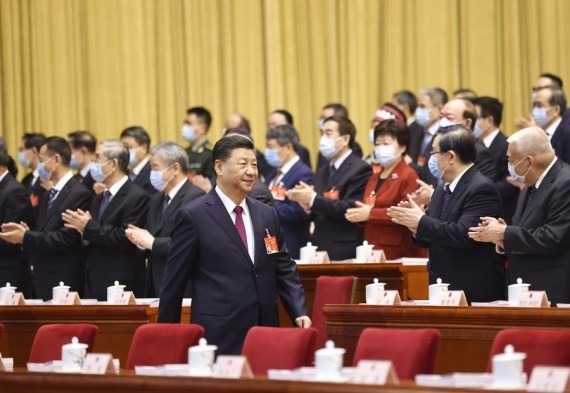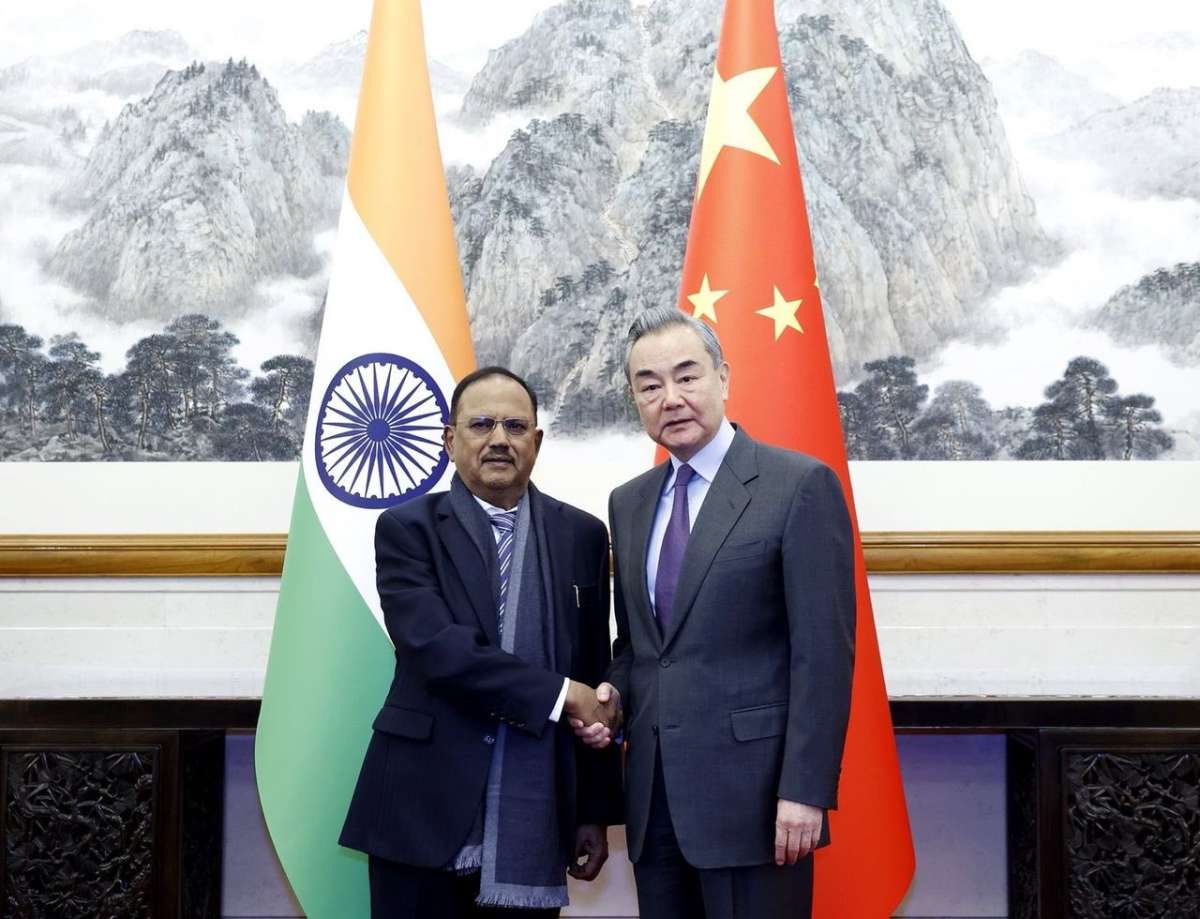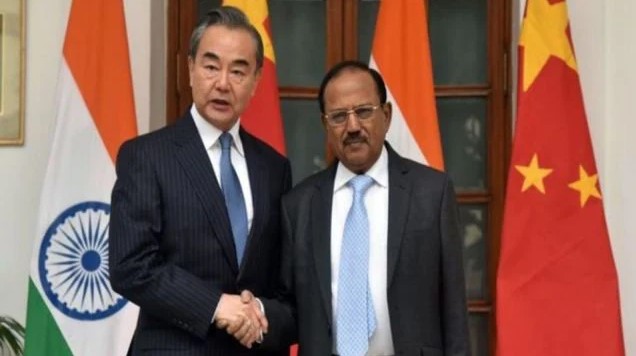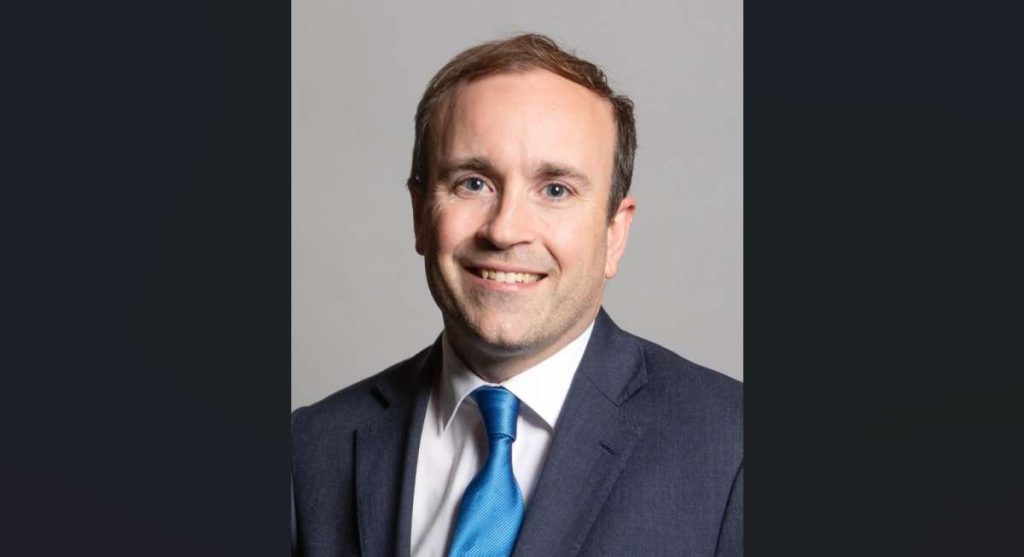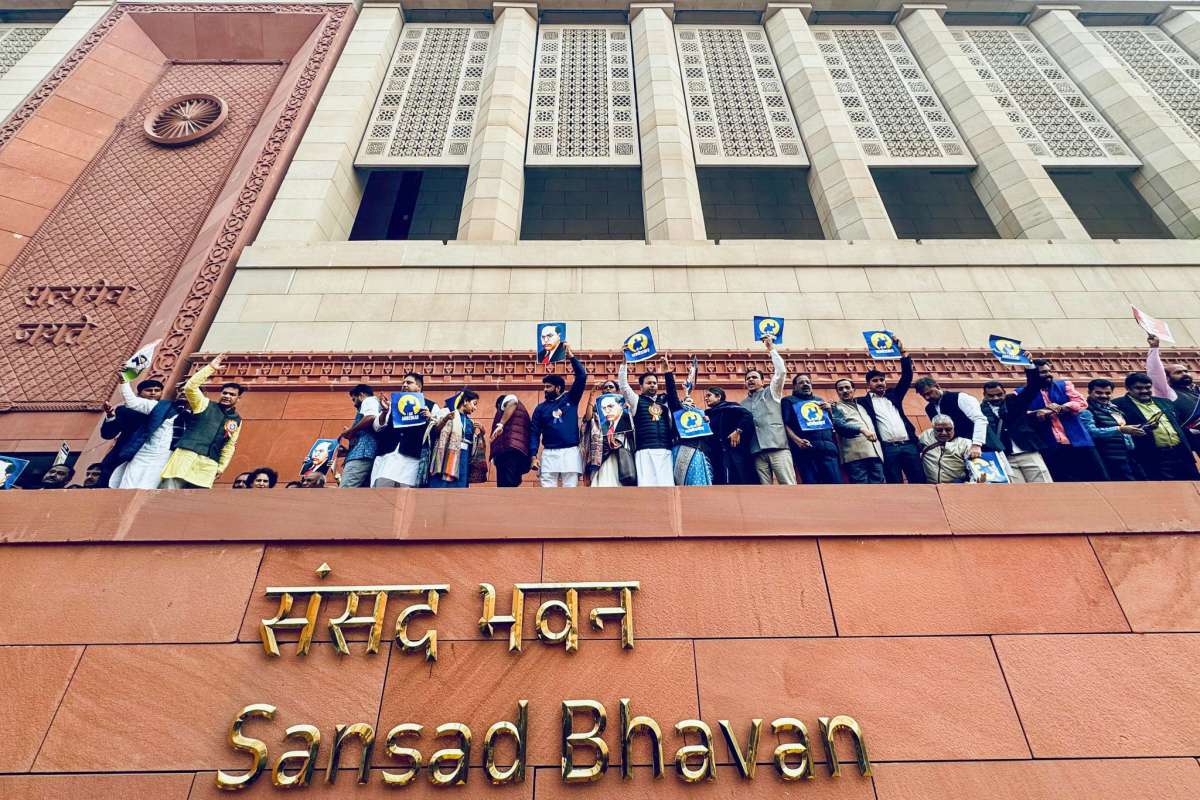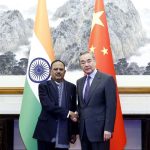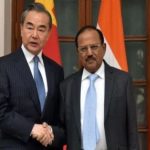Hong Kong-raised businessman Desmond Shum identified seven failures of Xi, including political centralization, suppression of civil freedoms, mishandling of COVID-19, and aggressive nationalism. He argues these missteps have eroded confidence in Xi’s leadership.
Recently circulating on social media was a photo of a Chinese soldier wedding his bride. Behind them, an enormous slogan was emblazoned: “Listen to Chairman Xi’s command; Be responsible to Chairman Xi; Let Chairman Xi rest assured.”
These were the kinds of slogans prevalent during the Cultural Revolution of the 1960s, promoting a personality cult for Mao Zedong.
There can be no questioning the centrality of Xi in China but as the country’s economy increasingly struggles, many are questioning the direction Chairman Xi Jinping has taken China.
One who is critical of Xi is Desmond Shum, a Hong Kong-raised businessman who was once married to billionaire businesswoman Duan Weihong. Witnessing the direction Xi was taking China, Shum departed China in 2015 and, six years later, wrote Red Roulette, a book that describes corruption within the Chinese Communist Party (CCP).
In mid-October, he posted public criticism of Xi on social media, saying, “Xi is systematically dismantling the most valuable asset of the CCP: public trust. Over the past few weeks, we’ve witnessed the wreckage of Xi’s financial policies unfolding in real-time.”
Shum continued: “To me, the more pressing issue isn’t merely the financial mishaps but how Xi is eroding the longstanding trust and confidence the Chinese people once had in CCP governance. While this is probably unintentional on his part, it is definitely systematic and far-reaching.”
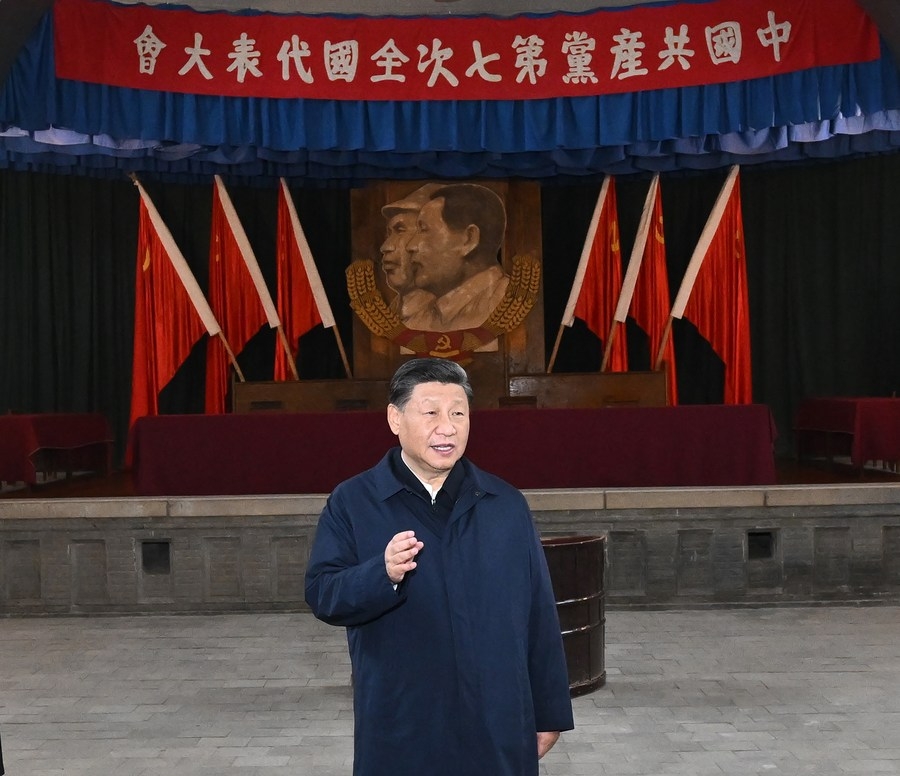
He said previous Chinese leaders like Deng Xiaoping, Jiang Zemin and Hu Jintao were generally pragmatic. “This created a bond between the CCP and the public, rooted in the belief that the party was steering China towards continued prosperity. However, Xi has systematically undermined this trust through a combination of political centralization, economic clampdowns and a stifling of civil society.
His leadership marks a sharp departure from the more collective and pragmatic governance approach seen in previous administrations.”
Shum highlighted seven specific areas of failure. The first is political centralisation and authoritarianism, as Xi concentrated power to a degree not seen since Mao. Secondly, he has suppressed civil society and freedoms through censorship, crackdowns on non governmental organisations and the treatment of Hong Kong.
Thirdly, Xi’s anti- corruption campaign, initially popular, is now viewed as a political purge that has generated fear without rooting out corruption.
Fourthly, Xi has eroded longstanding institutional norms, such as senior cadre appointments and bureaucratic procedures.
Fifthly, Shum said, Xi is to blame for economic tightening and state control, as his focus on expanding the role of state-owned enterprises came at the expense of the private sector.
Sixthly, Xi grossly mishandled COVID-19, and this was perhaps the most damaging action he ever took. “After years of strict zero-COVID policies that ground daily life to a halt, the sudden reversal in late 2022 shocked the nation.
Particularly among younger generations, many view this as a defining moment of CCP mismanagement.” Finally, Shum identified nationalism and Beijing’s aggressive stance on Taiwan, the South China Sea and the Indian border is a mistake.
Shum concluded: “When Wen Jiabao famously remarked that ‘confidence is more important than gold’ in 2008, it underscored the essential role trust plays in governance. Yet Xi has worked relentlessly–albeit unintentionally–to erode that very confidence.
His COVID management has shaken people’s trust in his societal governance, and the ongoing stock market debacle calls into question his ability to lead China’s economy. As trust in Xi’s leadership falters, the road ahead looks increasingly bleak.”
A Chatham House seminar on 24 September, titled “Can China still Prosper under Xi?” featured several experts, including Dr. Winnie King, Senior Lecturer in Chinese International Political Economy, University of Bristol. Asked about Xi’s performance, she noted, “I think in terms of the international system’s expectations of China, we’re quite disappointed, mainly because there was a lot of hope that he would bring in reform…”
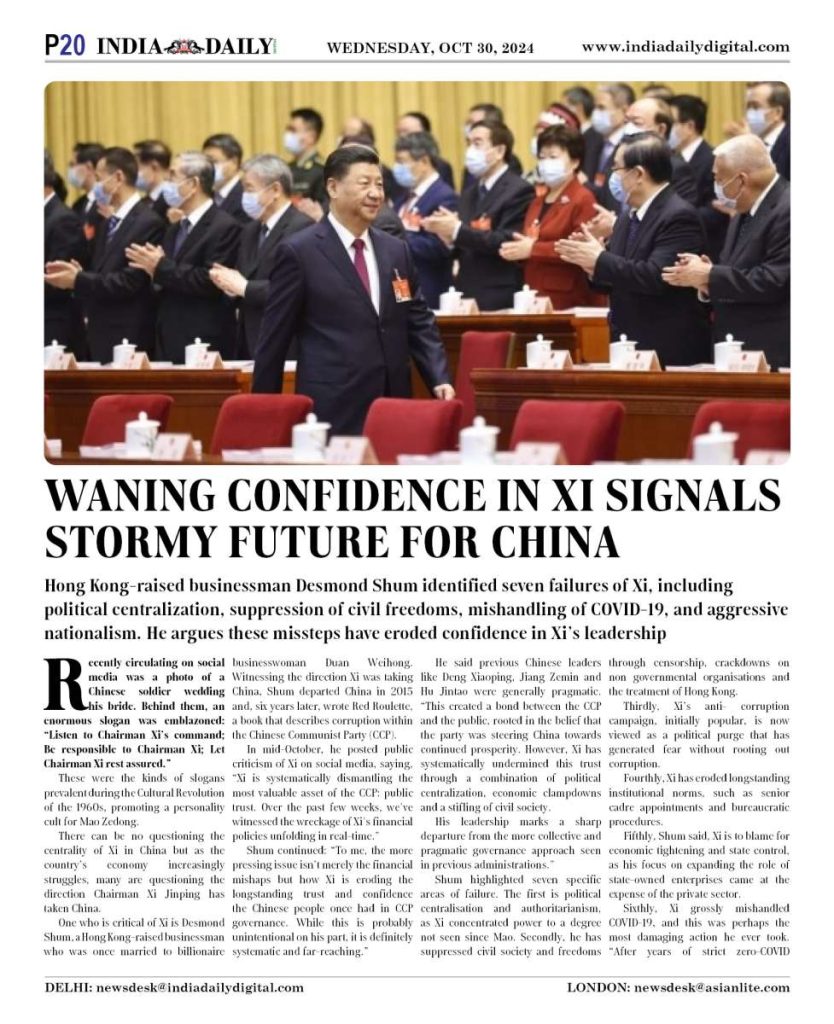
David Lubin, Michael Klein Research Fellow, Global Economy and Finance Programme, Chatham House, also participating in the seminar, said: “I think, if the question is, is he doing as much as he can do for the welfare of Chinese households, The answer is clearly no. But I don’t think that’s the question he’s asking himself. The question he’s asking himself is what can I do to promote the interests of the Chinese nation? And it’s interesting that those two ideas that are so separate in the Chinese context [is] because of the way Xi Jinping feels himself to be encircled geopolitically. So economic policy is oriented around the need to protect China from geopolitical risk. From that point of view, he probably thinks he’s doing quite well, but household welfare becomes a sort of sideshow.”
An economic macro trend is evident. China benefitted greatly from wider access to the global economy when it joined the World Trade Organisation in 2001, but China’s ability to generate structural growth started fading rapidly in the 2010s. Beijing’s solution was to leverage–to borrow funds to buy investments–and so it went on a huge credit binge even whilst the West was deleveraging to repair balance sheets. From 2012-16, the Chinese corporate sector took on much of the burden as companies attempted to level up their business models and expand operations in the West.
Chinese household debt rose quickly at the same time. This was because China’s business model was not about rewarding workers with greater wages, for that would hurt Chinese exports.
Instead, the easiest way for households to join the wealth creation craze was via the real estate market. As more houses were purchased, prices rose, and at last, the average Chinese person felt they were getting richer. In fact, property currently accounts for 62 per cent of Chinese household net worth, compared to just 23 per cent in the US.
However, Xi clamped down on the property sector as he signalled that paper wealth creation should be brought under control and as he promoted “common prosperity.” The results were predictable, as the government could not deleverage a USD50-trillion real estate bubble in an orderly manner. As house prices fell, indebted households and developers sold off properties to fix their balance sheets. In a vicious cycle, fewer Chinese are seeking mortgages and less credit is available, causing prices to further tumble. Interest rates are dropping in China, and pressure on the Chinese yuan is building.
Incidentally, China will lift the retirement age from next year. Beijing listed factors for this, such as a rising life expectancy (78.6 in 2023 compared to 35 in 1949) and average years of education for new entrants in the workforce (14 years of education in 2023, versus eight years in 1982).
However, the real reason forcing this change is an ageing population, a plummeting birthrate and a tighter pension budget. Shum said 2008 was a watershed moment for the CCP when it realised the Western model had failings. Indeed, as the rest of the world reeled, Beijing emerged as something of a hero as the West relied on China to stabilise things. “That’s the moment when the Chinese leadership really decided, ‘Hey, their system is not that great; our system may not be that bad, so we need to find our own way. That’s the moment everything changed,” Shum said, well before Xi assumed the reins of power.
Concurrently, there was a diffusion of power throughout Chinese society, as private companies and wealthy individuals wielded more influence. Of course, this “was a problem for the party. The entire leadership sees that as a problem, but people are not sure what to do about it,” Shum explained. It was at this point that Xi stepped in. Lubin described, under Xi’s leadership, a change in balance of power between state-owned enterprises and the private sector to reduce the latter’s influence.
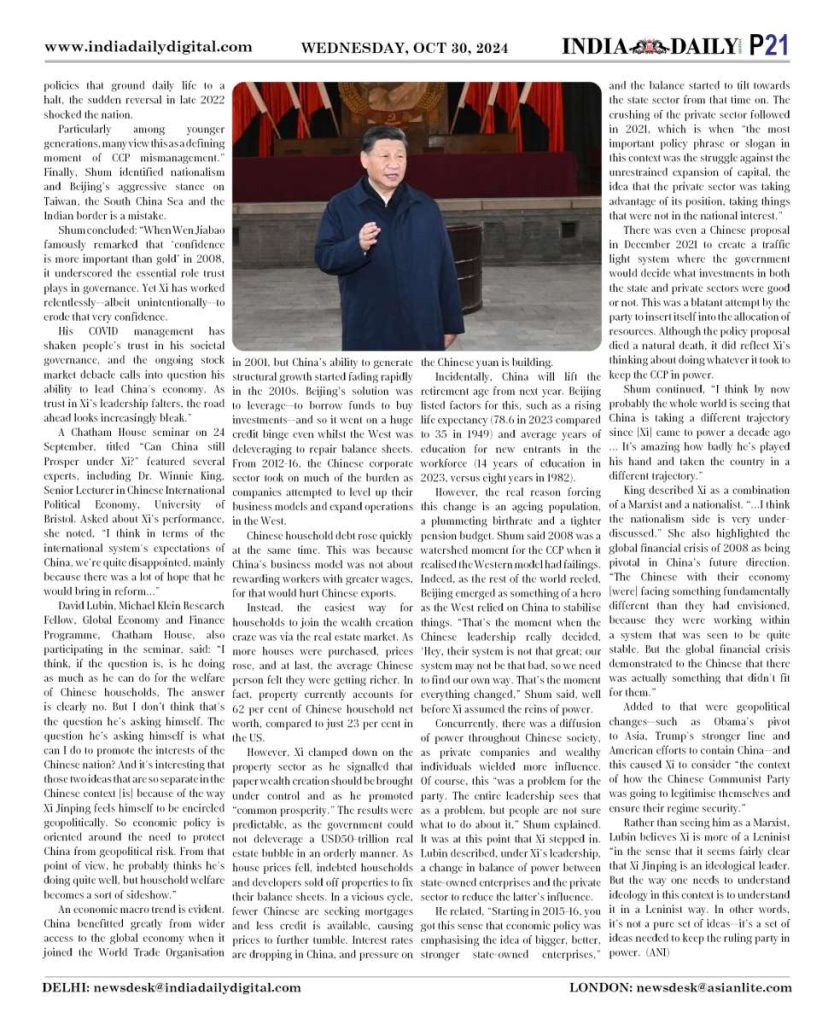
He related, “Starting in 2015-16, you got this sense that economic policy was emphasising the idea of bigger, better, stronger state-owned enterprises,” and the balance started to tilt towards the state sector from that time on. The crushing of the private sector followed in 2021, which is when “the most important policy phrase or slogan in this context was the struggle against the unrestrained expansion of capital, the idea that the private sector was taking advantage of its position, taking things that were not in the national interest.”
There was even a Chinese proposal in December 2021 to create a traffic light system where the government would decide what investments in both the state and private sectors were good or not. This was a blatant attempt by the party to insert itself into the allocation of resources. Although the policy proposal died a natural death, it did reflect Xi’s thinking about doing whatever it took to keep the CCP in power.
Shum continued, “I think by now probably the whole world is seeing that China is taking a different trajectory since [Xi] came to power a decade ago … It’s amazing how badly he’s played his hand and taken the country in a different trajectory.”
King described Xi as a combination of a Marxist and a nationalist. “…I think the nationalism side is very under-discussed.” She also highlighted the global financial crisis of 2008 as being pivotal in China’s future direction. “The Chinese with their economy [were] facing something fundamentally different than they had envisioned, because they were working within a system that was seen to be quite stable. But the global financial crisis demonstrated to the Chinese that there was actually something that didn’t fit for them.”
Added to that were geopolitical changes–such as Obama’s pivot to Asia, Trump’s stronger line and American efforts to contain China–and this caused Xi to consider “the context of how the Chinese Communist Party was going to legitimise themselves and ensure their regime security.”
Rather than seeing him as a Marxist, Lubin believes Xi is more of a Leninist “in the sense that it seems fairly clear that Xi Jinping is an ideological leader. But the way one needs to understand ideology in this context is to understand it in a Leninist way. In other words, it’s not a pure set of ideas–it’s a set of ideas needed to keep the ruling party in power.
That is quintessentially a Leninist approach, and I think that’s his approach.” Shum, taking part in the same Chatham House seminar, gave this assessment of Xi. “First and foremost, we really need to see him as a man of conviction and belief. He’s a man of conviction and belief; seeing him as a power-hungry dictator is really missing the point.
I think his vision for China is that it needs to be the primary geopolitical power, and rival, of the US. He believes the Chinese Communist Party should be the eternal ruler of China as a nation… You may not agree with his belief and conviction, and some of the worst tragedies of mankind in history happened [because of] people like Mao, like Hitler, like Stalin. Those were men of belief.”
Shum warned: “A man with belief of the wrong kind can do the most damage to humanity, and I tend to believe he’s that sort.” He noted that for Xi, “the party interest comes first,” rather than the people.
He said Xi set himself up for this declining state of affairs. By arresting hundreds of thousands, he was riding a tiger and cannot release his grip on power. As economic conditions worsen, Xi and his party core must increase their stranglehold over society because they are afraid of a backlash. However, Shum does not foresee a “collapse” of the CCP. He believes this is the wrong term; instead, he views it is a “long decline, because the CCP has such a complete hold on the country.”
China has lost its luster for many foreign investors and for many Chinese. This year, China will experience its largest-ever outflow of high-net-worth individuals. In 2024, a record exodus of 15,200 wealthy individuals is expected, greater than the 13,800 who departed in 2023.
Illustrating how Xi’s ideology means nothing to them, many pragmatic Chinese fear their wealth will be appropriated by the government. As Shum himself admitted, “As long as my money is in China, it’s not really my money. The moment my money is out of China; that’s my money!” (ANI)
ALSO READ: West urges China to release detained Uyghurs, Tibetans
